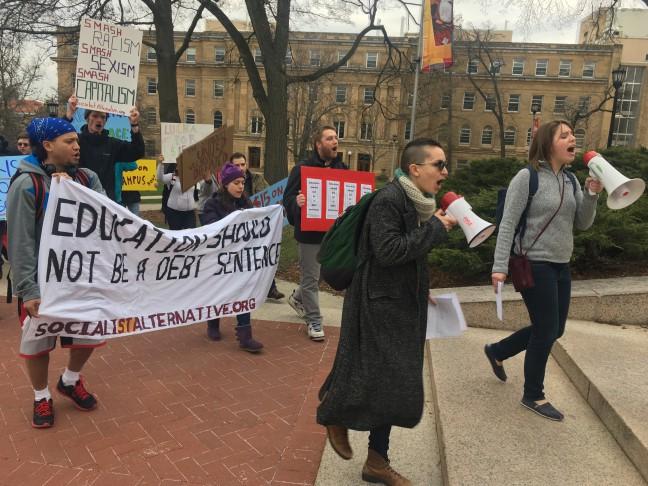The Biden administration launched a program Oct. 17 that would forgive student debt for millions across the nation, with the program forgiving up to $20,000. Since the program launched, it has faced criticism and a number of lawsuits attempting to stop the implementation of this program have been filed.
One of the most recent lawsuits against the program came from the Brown County Taxpayers Association, a conservative group based in Wisconsin. The case was earlier dismissed by Judge William Griesbach, as he determined the group did not have the legal standing or right to proceed with the case. It was then appealed to the Supreme Court but rejected by Supreme Court Justice Amy Coney Barrett.
The group argued that the forgiveness program will cost an estimated $400 billion in taxpayer money over the next 30 years, and that the program is violating the 14th Amendment’s equal protection clause. The group argues that there is unfair racial prejudice in the program because the Biden Administration stated student debt relief could help offset racial disparities.
Biden’s student debt forgiveness plan will forgive up to $10,000 in loans for individuals making under $125,000 a year, and Pell Grants recipients in that range will be eligible for up to $20,000 in loan forgiveness. This plan is estimated to help out a staggering 40 million Americans who have a combined student loan debt of $1.7 trillion, according to a statement from Biden.
University of Wisconsin students and graduates could benefit significantly from this plan, as some could receive up to $20,000 in student loans forgiven simply by filling out a short application. Considering the average UW graduate who received their bachelor’s degree graduated with $28,255 of debt, this program will be extremely beneficial to current students and graduates of the university alike.
The program would also benefit Americans more broadly, so the pushback by certain politicians and organizations is perplexing. By erasing such a large amount of student debt, the Biden administration can help ease financial tension for millions of Americans while also helping mitigate the wealth gap in America.
Interestingly enough, many politicians advocating for dismantling this program received massive Payback Protection Program loans that were forgiven during the pandemic. Congresswoman Marjorie Taylor Greene has been a vocal critic of the student debt forgiveness, according to a Twitter thread from the White House in August. Despite her claims, the congresswoman had over $180,000 in PPP loans forgiven.
The idea that taxpayer money would be wasted if student loans were forgiven fails to capture the scope of benefits it would bring. This program will help millions of people better their lives by removing a massive financial burden and will also help current college students finish their education, receive their degrees and enter the workforce.
Further, the claim that the student debt relief program violates the equal protection clause does not have legal evidence to back it up — an assessment even conservative Justice Coney Barrett could make. Two previous rulings on the equal protection clause demonstrate this discrepancy.
In Brown v. Board of Education, the Supreme Court ruled that keeping racial groups “separate but equal” was in direct violation of the 14th Amendment’s equal protection clause, and therefore segregation in public schools was unconstitutional.
In University of California v. Bakke, Allan Bakke, a white man, was rejected from the University of California Medical School at Davis University twice. The university had set 16 spots aside for minority candidates in order to address the exclusion of minorities from medical schools. For this reason, Bakke argued that his denial from the university was based on his race. The Supreme Court ultimately ruled that racial quotas were in violation of the equal protection clause, so Bakke was admitted to the university.
In these legal situations, a person or group of people was receiving unfair treatment based on their race, and therefore the systems were found to be in violation of the equal protection clause. Some critics say the debt relief program unfairly assists people of color, who are more likely to take out loans, have larger amounts of student debt and receive Pell grants. But this claim doesn’t address the full picture.
In contrast to the other legal cases, the forgiveness program does not discriminate on the basis of race. Anyone with student debt, regardless of race or ethnicity, has the opportunity to apply and reap the benefits.
Biden’s debt forgiveness program is a massive step in the right direction. In addition to easing the financial burden of college students, it will also make larger steps toward closing the wealth gap and attaining equality. Flimsy lawsuits are the only thing standing in the way of a more financially just future.
Josh Standal (jpstandal@wisc.edu) is a junior majoring in history.



